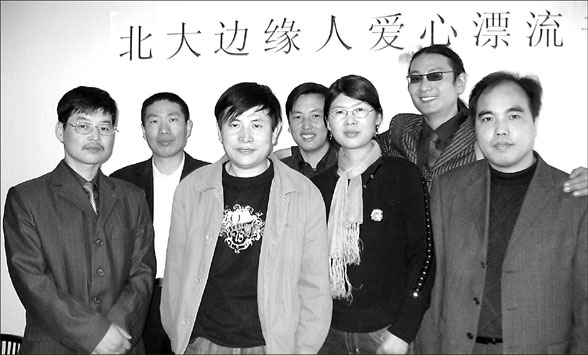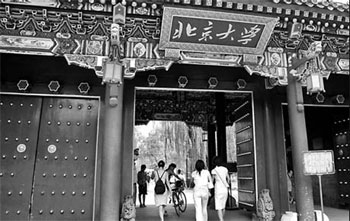The love of learning
|
Liu Zhe (right) with several of his casual student friends. Photo courtesy of Liu Zhe |
Last week, Wang Yixuan from the Inner Mongolia autonomous region took a decision that few of her contemporaries have dared to take. The 30-year-old left her hometown, despite her parents' fierce opposition, and came to Beijing to pursue further studies at Peking University.
"People may think that being single at my age, marriage is my top priority, but it has always been my dream to go to college," says Wang who has been helping her family run a small bookstore, ever since graduating from high school.
During a visit to the capital a few years ago, she toured Peking and Tsinghua university and was struck by the on-campus environment. A friend then suggested that Wang take some casual classes at Peking University, which has a tradition of being tolerant with anyone who wants to learn. Under this tradition, anyone can sit in on classes taken by the university professors but they are not enrolled as regular students, nor do they earn a degree or diploma. The friend introduced Wang to Liu Zhe, a well-known face among casual students on both campuses.
They first met in Liu's humble apartment, located in a suburb along Beijing's North Fifth Ring Road. The neighborhood teems with migrant workers as well as casual students attending classes at the nearby Peking, Tsinghua and other prestigious universities. Some work by day and attend night classes, while others devote their entire time preparing for graduate admissions.

"I'm so excited to be here. I'm interested in the management course because I want to start a company in the future. And I also like literature. I don't know which class I should start with. Do I have to learn math if I study economics, I am not good at it," Wang ponders her many options.
"Take it easy," advises an amiable Liu. "There will be a meeting of the casual students and professors here at the weekend. Come and join us, and you may find the answers."
Liu recently started to organize a society of casual students to help newcomers to Beijing with renting apartments, choosing courses and exchanging campus tips.
He says not all students last long; some find their interest in learning waning while others lack a systematic approach to their studies and end up with little to show by way of progress, after years of study.
"That's why a platform to enhance exchanges among casual students and with the regular ones, is necessary," he says.
"Particularly for newcomers like Wang," Liu adds, "I wish our help can make their life here easier and more focused than mine was when I started as a casual student more than 10 years ago."
Born in Zhejiang province, Liu failed the college entrance examination and later found a job at a library, where he threw himself into research on Cao Juren (1900-72), also a native of Zhejiang and noted contemporary writer, scholar and journalist.
"I first read his book I and My World in high school. I was delighted by his knowledge and resolved to follow in his footsteps," Liu says.
To continue his learning, Liu wrote to a number of colleges and institutions to collect material about Cao Juren. A teacher of Chinese literature at Peking University, expressed appreciation for Liu's initiative and persuaded him to attend the university's Chinese class to boost his research efforts.
In his first year in Peking University, Liu could barely make ends meet. He almost ran out of the money - 3,000 yuan ($423) - that his parents had saved for his wedding, in just a couple of months, most of it going toward rent. He moved into a storeroom, which covered a mere 5 sq m with no facilities. He made a "bed" with some bricks and wooden boards, and named the room "jing xin zhai", meaning a place for the solitude of the soul.
"There was no heating, and it was freezing cold in winter nights. My pens were often frozen," he says.
In his spare time, Liu took on several odd jobs to support himself. He earned 120 yuan for writing addresses on envelopes for two days. He also removed bricks at a construction site.
|
Peking University is known for giving a chance to casual students. Li Bin |
On occasion, he survived on just one meal of steamed bread (mantou) and couldn't even afford a long-distance phone call home. He was later expelled from the storeroom by the security staff and kept moving around for the next nine years. His condition improved after he found part-time work in the university's publishing house, a year later.
"But I really appreciate the difficult times I lived through in that storeroom. I read and wrote a lot. Those were fruitful days, " he says.
Liu sat in on classes of Chinese, history, law, education, philosophy and economics. He also became active in students' societies. He says the three treasures of Peking University are the library, the professors and the academic symposiums.
"I could have been in business and wealthy by now if I had stayed at home," he says, sitting in his plainly-furnished living room. "Yet, the past decade in Beijing has broadened my horizons and made me feel more confident."
Twenty-year-old Gao Sheng has just started life as a casual student. The boy from Liaoning province tired of schooling and dropped out of high school. Yet his talents in writing did not go unrecognized and he was able to get three of his novels published.
"Meanwhile, I've realized that I don't have a solid literary background. I write characters wrongly and misuse idioms. I need to push my literary ability to a higher level," he says.
With the help of Liu and other volunteers, Gao has been taking university classes for the past few weeks. However, after listening to some speeches made by business icons, he says: "I am impressed by how these people have overcome the circumstances of their lives to achieve success. I've found that writing is only for fun. I can't live on it. Operating a company is more challenging. I will invest more time in learning about this."
Gao now shares an apartment with his elder brother, also a casual student at Peking University.
"Unlike my brother, I think experience is more important than a university diploma. Besides attending the course, I am also looking for a job, so that I can practice what I've learned.
"I have lived under my parents' wings for 20 years. I will try my best to complete my studies here on my own," he says.
(China Daily 03/20/2008 page19)
















